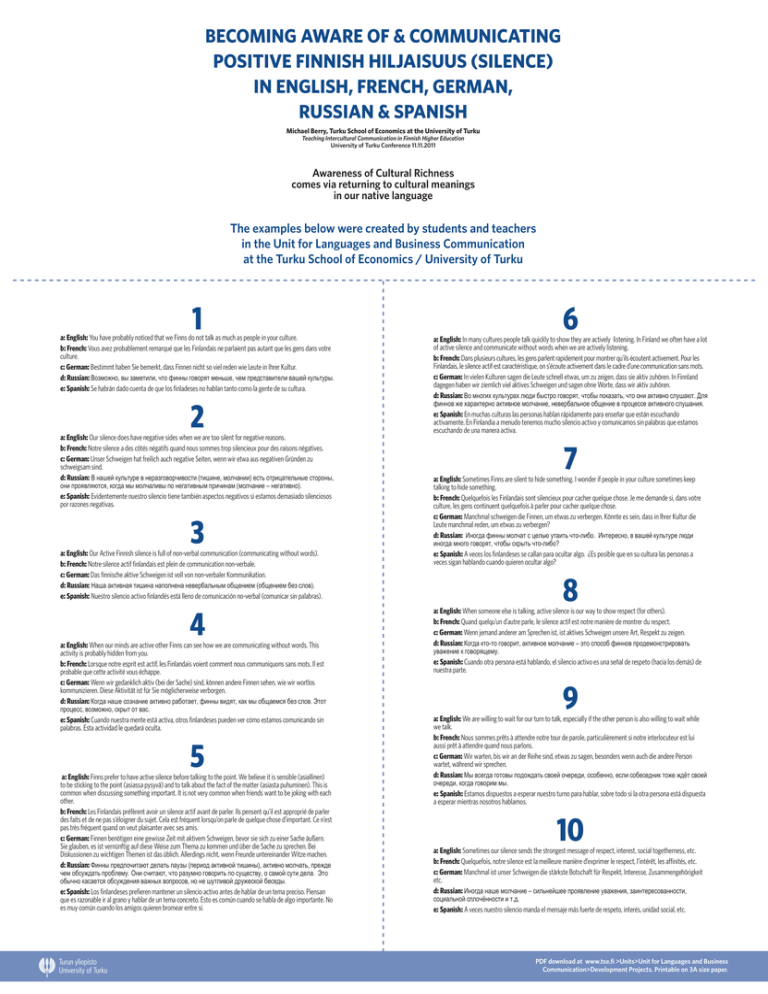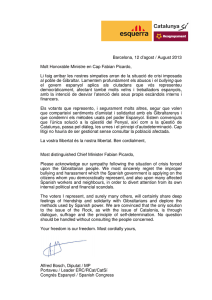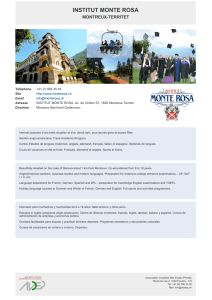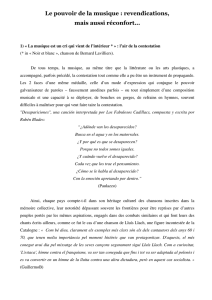English
Anuncio

BECOMING AWARE OF & COMMUNICATING POSITIVE FINNISH HILJAISUUS (SILENCE) IN ENGLISH, FRENCH, GERMAN, RUSSIAN & SPANISH Michael Berry, Turku School of Economics at the University of Turku Teaching Intercultural Communication in Finnish Higher Education University of Turku Conference 11.11.2011 Awareness of Cultural Richness comes via returning to cultural meanings in our native language The examples below were created by students and teachers in the Unit for Languages and Business Communication at the Turku School of Economics / University of Turku 1 a: English: You have probably noticed that we Finns do not talk as much as people in your culture. b: French: Vous avez probablement remarqué que les Finlandais ne parlaient pas autant que les gens dans votre culture. c: German: Bestimmt haben Sie bemerkt, dass Finnen nicht so viel reden wie Leute in Ihrer Kultur. d: Russian: Возможно, вы заметили, что финны говорят меньше, чем представители вашей культуры. e: Spanish: Se habrán dado cuenta de que los finladeses no hablan tanto como la gente de su cultura. 2 a: English: Our silence does have negative sides when we are too silent for negative reasons. b: French: Notre silence a des côtés négatifs quand nous sommes trop silencieux pour des raisons négatives. c: German: Unser Schweigen hat freilich auch negative Seiten, wenn wir etwa aus negativen Gründen zu schweigsam sind. d: Russian: В нашей культуре в неразговорчивости (тишине, молчании) есть отрицательные стороны, они проявляются, когда мы молчаливы по негативным причинам (молчание – негативно). e: Spanish: Evidentemente nuestro silencio tiene también aspectos negativos si estamos demasiado silenciosos por razones negativas. 3 a: English: Our Active Finnish silence is full of non-verbal communication (communicating without words). b: French: Notre silence actif finlandais est plein de communication non-verbale. c: German: Das finnische aktive Schweigen ist voll von non-verbaler Kommunikation. d: Russian: Наша активная тишина наполнена невербальным общением (общением без слов). e: Spanish: Nuestro silencio activo finlandés está lleno de comunicación no-verbal (comunicar sin palabras). 4 a: English: When our minds are active other Finns can see how we are communicating without words. This activity is probably hidden from you. b: French: Lorsque notre esprit est actif, les Finlandais voient comment nous communiquons sans mots. Il est probable que cette activité vous échappe. c: German: Wenn wir gedanklich aktiv (bei der Sache) sind, können andere Finnen sehen, wie wir wortlos kommunizieren. Diese Aktivität ist für Sie möglicherweise verborgen. d: Russian: Когда наше сознание активно работает, финны видят, как мы общаемся без слов. Этот процесс, возможно, скрыт от вас. e: Spanish: Cuando nuestra mente está activa, otros finlandeses pueden ver cómo estamos comunicando sin palabras. Esta actividad le quedará oculta. 5 a: English: Finns prefer to have active silence before talking to the point. We believe it is sensible (asiallinen) to be sticking to the point (asiassa pysyvä) and to talk about the fact of the matter (asiasta puhuminen). This is common when discussing something important. It is not very common when friends want to be joking with each other. b: French: Les Finlandais préfèrent avoir un silence actif avant de parler. Ils pensent qu’il est approprié de parler des faits et de ne pas s’éloigner du sujet. Cela est fréquent lorsqu’on parle de quelque chose d’important. Ce n’est pas très fréquent quand on veut plaisanter avec ses amis. c: German: Finnen benötigen eine gewisse Zeit mit aktivem Schweigen, bevor sie sich zu einer Sache äußern. Sie glauben, es ist vernünftig auf diese Weise zum Thema zu kommen und über die Sache zu sprechen. Bei Diskussionen zu wichtigen Themen ist das üblich. Allerdings nicht, wenn Freunde untereinander Witze machen. d: Russian: Финны предпочитают делать паузы (период активной тишины), активно молчать, прежде чем обсуждать проблему. Они считают, что разумно говорить по существу, о самой сути дела. Это обычно касается обсуждения важных вопросов, но не шутливой дружеской беседы. e: Spanish: Los finlandeses prefieren mantener un silencio activo antes de hablar de un tema preciso. Piensan que es razonable ir al grano y hablar de un tema concreto. Esto es común cuando se habla de algo importante. No es muy común cuando los amigos quieren bromear entre sí. 6 a: English: In many cultures people talk quickly to show they are actively listening. In Finland we often have a lot of active silence and communicate without words when we are actively listening. b: French: Dans plusieurs cultures, les gens parlent rapidement pour montrer qu’ils écoutent activement. Pour les Finlandais, le silence actif est caractéristique, on s’écoute activement dans le cadre d’une communication sans mots. c: German: In vielen Kulturen sagen die Leute schnell etwas, um zu zeigen, dass sie aktiv zuhören. In Finnland dagegen haben wir ziemlich viel aktives Schweigen und sagen ohne Worte, dass wir aktiv zuhören. d: Russian: Во многих культурах люди быстро говорят, чтобы показать, что они активно слушают. Для финнов же характерно активное молчание, невербальное общение в процессе активного слушания. e: Spanish: En muchas culturas las personas hablan rápidamente para enseñar que están escuchando activamente. En Finlandia a menudo tenemos mucho silencio activo y comunicamos sin palabras que estamos escuchando de una manera activa. 7 a: English: Sometimes Finns are silent to hide something. I wonder if people in your culture sometimes keep talking to hide something. b: French: Quelquefois les Finlandais sont silencieux pour cacher quelque chose. Je me demande si, dans votre culture, les gens continuent quelquefois à parler pour cacher quelque chose. c: German: Manchmal schweigen die Finnen, um etwas zu verbergen. Könnte es sein, dass in Ihrer Kultur die Leute manchmal reden, um etwas zu verbergen? d: Russian: Иногда финны молчат с целью утаить что-либо. Интересно, в вашей культуре люди иногда много говорят, чтобы скрыть что-либо? e: Spanish: A veces los finlandeses se callan para ocultar algo. ¿Es posible que en su cultura las personas a veces sigan hablando cuando quieren ocultar algo? 8 a: English: When someone else is talking, active silence is our way to show respect (for others). b: French: Quand quelqu’un d’autre parle, le silence actif est notre manière de montrer du respect. c: German: Wenn jemand anderer am Sprechen ist, ist aktives Schweigen unsere Art, Respekt zu zeigen. d: Russian: Когда кто-то говорит, активное молчание – это способ финнов продемонстрировать уважение к говорящему. e: Spanish: Cuando otra persona está hablando, el silencio activo es una señal de respeto (hacia los demás) de nuestra parte. 9 a: English: We are willing to wait for our turn to talk, especially if the other person is also willing to wait while we talk. b: French: Nous sommes prêts à attendre notre tour de parole, particulièrement si notre interlocuteur est lui aussi prêt à attendre quand nous parlons. c: German: Wir warten, bis wir an der Reihe sind, etwas zu sagen, besonders wenn auch die andere Person wartet, während wir sprechen. d: Russian: Мы всегда готовы подождать своей очереди, особенно, если собеседник тоже ждёт своей очереди, когда говорим мы. e: Spanish: Estamos dispuestos a esperar nuestro turno para hablar, sobre todo si la otra persona está dispuesta a esperar mientras nosotros hablamos. 10 a: English: Sometimes our silence sends the strongest message of respect, interest, social togetherness, etc. b: French: Quelquefois, notre silence est la meilleure manière d’exprimer le respect, l’intérêt, les affinités, etc. c: German: Manchmal ist unser Schweigen die stärkste Botschaft für Respekt, Interesse, Zusammengehörigkeit etc. d: Russian: Иногда наше молчание – сильнейшее проявление уважения, заинтересованности, социальной сплочённости и т.д. e: Spanish: A veces nuestro silencio manda el mensaje más fuerte de respeto, interés, unidad social, etc. PDF download at www.tse.fi >Units>Unit for Languages and Business Communication>Development Projects. Printable on 3A size paper.






